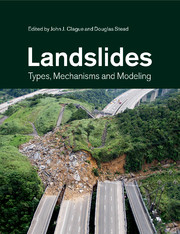Book contents
- Landslides
- Landslides
- Copyright page
- Contents
- Contributors
- Preface
- 1 Landslide hazard and risk
- 2 Landslides in the Earth system
- 3 Earthquake ground motion and patterns of seismically induced landsliding
- 4 Landslides at stratovolcanoes initiated by volcanic unrest
- 5 Mobility of long-runout rock avalanches
- 6 Rapid rock-slope failures
- 7 Risk assessments for debris flows
- 8 Landslides in quick clay
- 9 Controls on the distribution of major types of submarine landslides
- 10 Tsunami hazard assessment related to slope failures in coastal waters
- 11 Physical impacts of climate change on landslide occurrence and related adaptation
- 12 Landslides and geologic environments
- 13 Numerical modeling of rock-slope instability
- 14 Remote sensing techniques and landslides
- 15 Engineering geomorphology of landslides
- 16 Developments in landslide runout prediction
- 17 Models of the triggering of landslides during earthquakes
- 18 Slow rock-slope deformation
- 19 Landslide monitoring:
- 20 Groundwater in slopes
- 21 Soil slope stabilization
- 22 Rockfall characterization and modeling
- 23 The 2006 Eiger rockslide, European Alps
- 24 Randa:
- 25 Characterization and management of rockslide hazard at Turtle Mountain, Alberta, Canada
- 26 The Åknes rockslide, Norway
- 27 A seismometric approach for back-analyzing an unusual rockfall in the Apennines of Italy
- 28 Downie Slide, British Columbia, Canada
- 29 The 1963 Vaiont landslide, Italy
- 30 Hong Kong landslides
- 31 Landslides induced by the Wenchuan earthquake
- 32 Landslides on other planets
- Index
1 - Landslide hazard and risk
Published online by Cambridge University Press: 05 May 2013
- Landslides
- Landslides
- Copyright page
- Contents
- Contributors
- Preface
- 1 Landslide hazard and risk
- 2 Landslides in the Earth system
- 3 Earthquake ground motion and patterns of seismically induced landsliding
- 4 Landslides at stratovolcanoes initiated by volcanic unrest
- 5 Mobility of long-runout rock avalanches
- 6 Rapid rock-slope failures
- 7 Risk assessments for debris flows
- 8 Landslides in quick clay
- 9 Controls on the distribution of major types of submarine landslides
- 10 Tsunami hazard assessment related to slope failures in coastal waters
- 11 Physical impacts of climate change on landslide occurrence and related adaptation
- 12 Landslides and geologic environments
- 13 Numerical modeling of rock-slope instability
- 14 Remote sensing techniques and landslides
- 15 Engineering geomorphology of landslides
- 16 Developments in landslide runout prediction
- 17 Models of the triggering of landslides during earthquakes
- 18 Slow rock-slope deformation
- 19 Landslide monitoring:
- 20 Groundwater in slopes
- 21 Soil slope stabilization
- 22 Rockfall characterization and modeling
- 23 The 2006 Eiger rockslide, European Alps
- 24 Randa:
- 25 Characterization and management of rockslide hazard at Turtle Mountain, Alberta, Canada
- 26 The Åknes rockslide, Norway
- 27 A seismometric approach for back-analyzing an unusual rockfall in the Apennines of Italy
- 28 Downie Slide, British Columbia, Canada
- 29 The 1963 Vaiont landslide, Italy
- 30 Hong Kong landslides
- 31 Landslides induced by the Wenchuan earthquake
- 32 Landslides on other planets
- Index
Summary
Each year, landslides are responsible for hundreds of millions of dollars’ worth of damage and, on average, claim more than 1000 lives around the world. Although most common in mountainous areas, landslides can occur anywhere with enough local relief to generate gravitational stresses capable of causing rock or soil to fail. In recent decades, research rooted in engineering and the physical sciences, new technologies, and improvements in computational power have greatly advanced our understanding of the causes, triggers, and mechanics of landslides. However, these improvements and advances bear on only part of the landslide risk equation – hazard and exposure; other factors that affect risk are much less understood. Notably, vulnerability and coping capacity, two concepts most developed in the social sciences, play an important – but poorly understood – role in landslide risk. We provide an example of an attempt to estimate landslide risk, which illustrates the difficulty of adequately quantifying vulnerability. We also argue that landslide risk will almost certainly increase over the rest of this century, due to a large increase in global population, settlement and development of previously sparsely populated landslide-prone regions, and climate change.
- Type
- Chapter
- Information
- LandslidesTypes, Mechanisms and Modeling, pp. 1 - 9Publisher: Cambridge University PressPrint publication year: 2012
- 6
- Cited by

